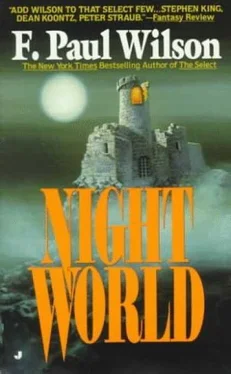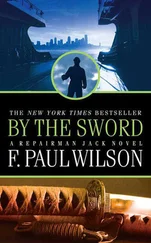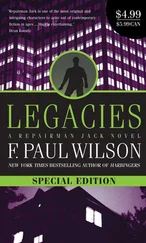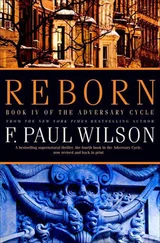F. Paul Wilson - Nightworld
Здесь есть возможность читать онлайн «F. Paul Wilson - Nightworld» весь текст электронной книги совершенно бесплатно (целиком полную версию без сокращений). В некоторых случаях можно слушать аудио, скачать через торрент в формате fb2 и присутствует краткое содержание. Жанр: Ужасы и Мистика, на английском языке. Описание произведения, (предисловие) а так же отзывы посетителей доступны на портале библиотеки ЛибКат.
- Название:Nightworld
- Автор:
- Жанр:
- Год:неизвестен
- ISBN:нет данных
- Рейтинг книги:3 / 5. Голосов: 1
-
Избранное:Добавить в избранное
- Отзывы:
-
Ваша оценка:
- 60
- 1
- 2
- 3
- 4
- 5
Nightworld: краткое содержание, описание и аннотация
Предлагаем к чтению аннотацию, описание, краткое содержание или предисловие (зависит от того, что написал сам автор книги «Nightworld»). Если вы не нашли необходимую информацию о книге — напишите в комментариях, мы постараемся отыскать её.
Nightworld — читать онлайн бесплатно полную книгу (весь текст) целиком
Ниже представлен текст книги, разбитый по страницам. Система сохранения места последней прочитанной страницы, позволяет с удобством читать онлайн бесплатно книгу «Nightworld», без необходимости каждый раз заново искать на чём Вы остановились. Поставьте закладку, и сможете в любой момент перейти на страницу, на которой закончили чтение.
Интервал:
Закладка:
Wonders were close at hand too. Directly below the lanai her silversword garden grew. She had transplanted the seedlings from her wanderings on Haleakala's slopes and was perhaps unduly proud of her collection of the rare spiky clusters. Each would grow for twenty years before producing its one magnificent flower. Kolabati could wait. She had time.
She glanced down at the cup in her hands. Oh, yes. And coffee from the big island's Kona Coast—the richest coffee in the world. She sipped.
No, she could not see herself tiring of living here, even if she didn't have Moki. But Moki was here, and Moki gave meaning to all of it.
She could hear him in the back now, working in his shop. Moki—her kane, her man. He carved driftwood. Together they would scour the beaches and the banks of Haleakala's countless streams and waterfalls, searching for branches and small trunks, the long dead pieces, bleached and hardened by time and the elements. They'd bring these gnarled, weathered remains back to the house and set them up around Moki's workshop. There he would get to know them, live with them for a while. And gradually he would see things in them—the wrinkles around the eyes of an old woman's face, the curve of a panther's back, a lizard's claws. Once he had spied the form hiding within, he would bring his small ax and array of chisels into play, working on the wood and with the wood to expose the hidden form to the light of day.
Moki was modest about his work, never taking credit and refusing blame for the nature of the works he produced. His stock phrase: "It was already there in the wood; I just cleared away the excess material and set it free."
But he deserved far more credit than he took. For Moki wasn't content to leave his work as simple wood sculptures. They were Hawaiian wood carved by an almost full-blooded Hawaiian, but that wasn't quite Hawaiian enough for Moki. When each was finished he shipped it to the big island and carried it to the fiery mouth of Kilauea, the active crater on the southeastern slope of Mauna Loa. There he trapped some of the living lava, poured it into a shape that complemented his sculpture, allowed the lava to cool to a point where it wouldn't damage the wood, then set his sculpture into the gooey stone.
Kolabati had first seen Moki's work with its intricate cuts and swirls and unique lava rock bases in a Honolulu gallery. She'd been completely taken by them and had asked to meet the artist. She commissioned a piece, and visited Moki many times during its fashioning. She found herself as taken by the man as she was by his work. His intensity, his passion for living, his love of his native islands. He was complete. In that sense he reminded her a little of her dead brother, Kusum.
Moki wanted her, but he didn't need her, and that made him all the more attractive. Theirs was a relationship of passionate equals. She didn't want to own Moki, didn't demand all his passion. She knew some of his passion had to be funneled off into his art and she encouraged that. To dominate him, to possess him would risk destroying a wild and wonderful talent. Instead of having all of him, she would wind up with less than she had begun with.
Moki needed his art, needed to be Moki, and very much needed to be Hawaiian. He would have loved to have lived and worked on Niihau, the forbidden island, oldest of the Hawaiian chain, but had not been able to wrangle an invitation from the last of the pure-bred Hawaiians living there in the old, primitive ways. Like most Hawaiians, Moki was not pure-bred—he could find traces of Portuguese and Filipino in his bloodline.
But he remained pure Hawaiian in his heart, dressing the part around their hale or house, speaking the old language and teaching it to Kolabati. And together they moved to the side of Haleakala where he carved and sculpted his wood, and braved the heat of Kilauea to fashion his pieces.
The results, the graceful and the grotesque, were scattered about the islands, in galleries, museums, corporate offices, and on every available surface in their house. Kolabati loved the clutter, which was unusual for her. As a rule she preferred an ordered existence. But not in this case. The clutter was Moki. It put his stamp on their home, made it truly theirs. For there was no other place on earth quite like it.
And Kolabati did not want that to change. For the first time in her many years the persistent voice of dissatisfaction was silent within her. For the first time she no longer hungered for new people, new sensations, new feelings, the Next New Thing. Continuity—that was what counted most now.
"Bati. Hele mai!"
Moki's voice, calling from his workshop, telling her to come to him. He sounded excited. She started toward the rear of the house but he was already coming her way.
The old Kolabati used to tire of a man after two weeks. They were all the same; so few had anything new to offer. But even after two years with Moki, the sight of him still excited her. His long, wild, red-brown hair—he was considered an ehu, a red-haired Hawaiian—his lean, dark, muscled body, and his eyes as dark as her own. An artist, a sensitive man, as attuned to the mysteries of the wood he worked as to the mysteries within her own psyche. And yet he still retained an untamed quality, as witness the brief, loincloth-like malo he wore now. No two days were alike with Moki.
Which was why Kolabati called him her kane and allowed him to wear the other necklace.
And she loved his lilting accent.
"Bati look!"
He held out his left palm to her. A ragged red line ran across it.
"Oh, Moki! What happened?"
"I cut myself."
"But you're always cutting yourself."
She looked at the cut. It was barely bleeding. He'd done worse to his hands before. What was so special about this?
"Yes, but this was a bad one. I slipped badly. I thought the chisel went half way through my palm. Blood started spurting a foot into the air—and then it stopped. I squeezed it for a few minutes, and when I checked again, it was half healed. And in the time it took me to come in from the workshop, it's healed even further. Look at it. You can almost see it closing before your eyes!"
He was right. Kolabati watched with uneasy fascination as the wound stopped oozing and became shallower.
"What's going on?" he said.
"I don't know."
He touched the necklace around his throat—a heavy chain of sculpted iron, each crescent link embossed with pre-Vedic script; centered over the notch atop his breast bone lay a matched pair of bright yellow elliptical stones, like thumb-sized topazes, each with a black center. Moki's necklace perfectly matched her own. They'd been in her family for generations…since before history.
"You said these things would help heal us, keep us young and healthy, but I >never—"
"They don't work like this," Kolabati said. "They've never worked like this."
It was true. The necklace could heal illnesses, prolong life, stave off death from all but the most catastrophic injuries. But it worked slowly, subtly. Not like this. The healing of Moki's hand was crude, garish, like a sideshow trick.
Something was wrong.
"But they work like this now," Moki said, a wild light in his eyes. "Watch."
That was when she saw the wood knife in his other hand. He jabbed it through the skin on the underside of his left forearm and into the tissues beneath.
"No!" she cried. "Moki, don't!"
"It's all right, Bati. Just wait a minute and I'll show you what I mean."
Wincing with the pain, he dragged the blade upward until a four-inch wound gaped open. He watched the blood spurt for a moment, then squeezed it shut. He smiled crazily at her for a moment or two as he pressed the skin edges together, then he released it.
The wound had stopped bleeding. The edges were adhering as if they'd been sutured. And the light in his eyes was wilder than before.
Читать дальшеИнтервал:
Закладка:
Похожие книги на «Nightworld»
Представляем Вашему вниманию похожие книги на «Nightworld» списком для выбора. Мы отобрали схожую по названию и смыслу литературу в надежде предоставить читателям больше вариантов отыскать новые, интересные, ещё непрочитанные произведения.
Обсуждение, отзывы о книге «Nightworld» и просто собственные мнения читателей. Оставьте ваши комментарии, напишите, что Вы думаете о произведении, его смысле или главных героях. Укажите что конкретно понравилось, а что нет, и почему Вы так считаете.












